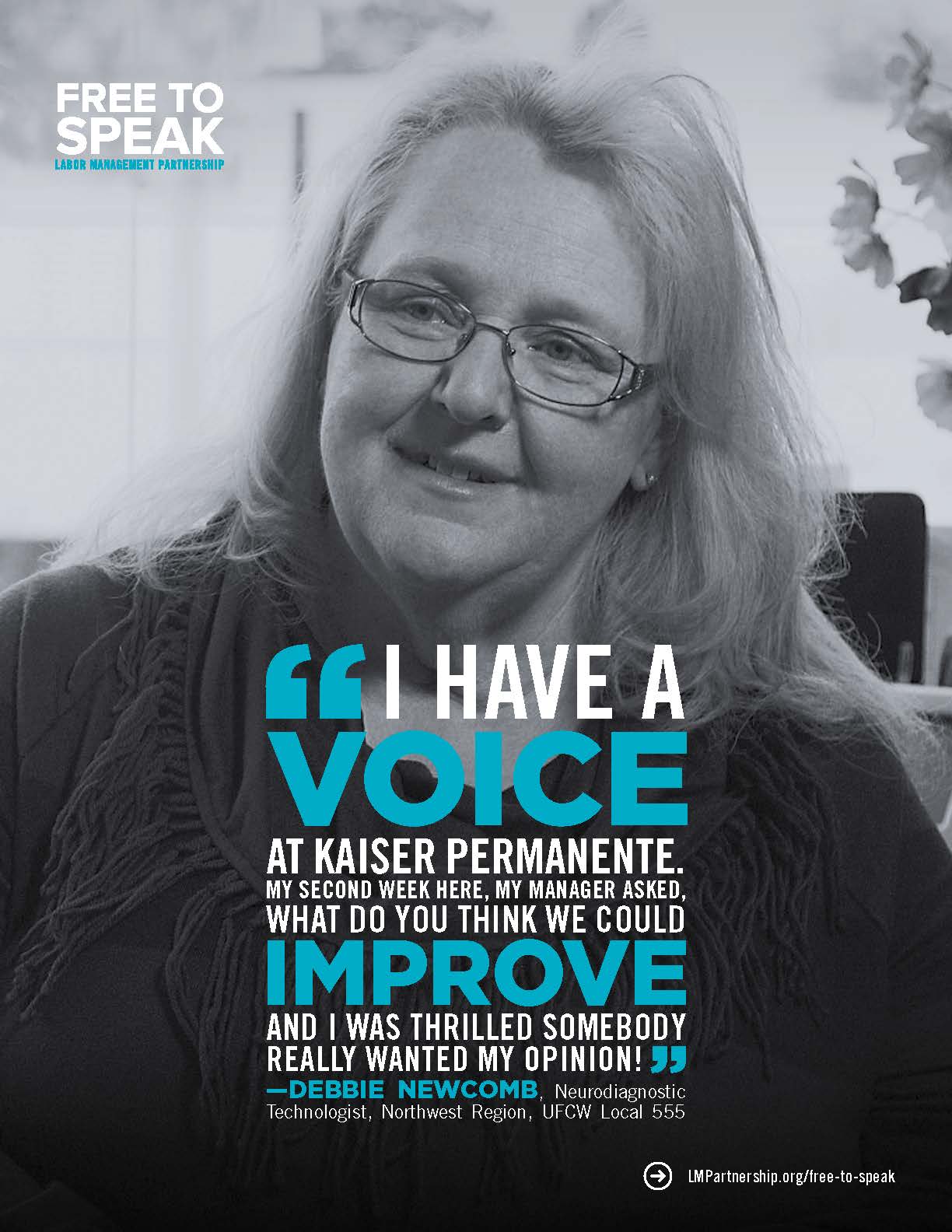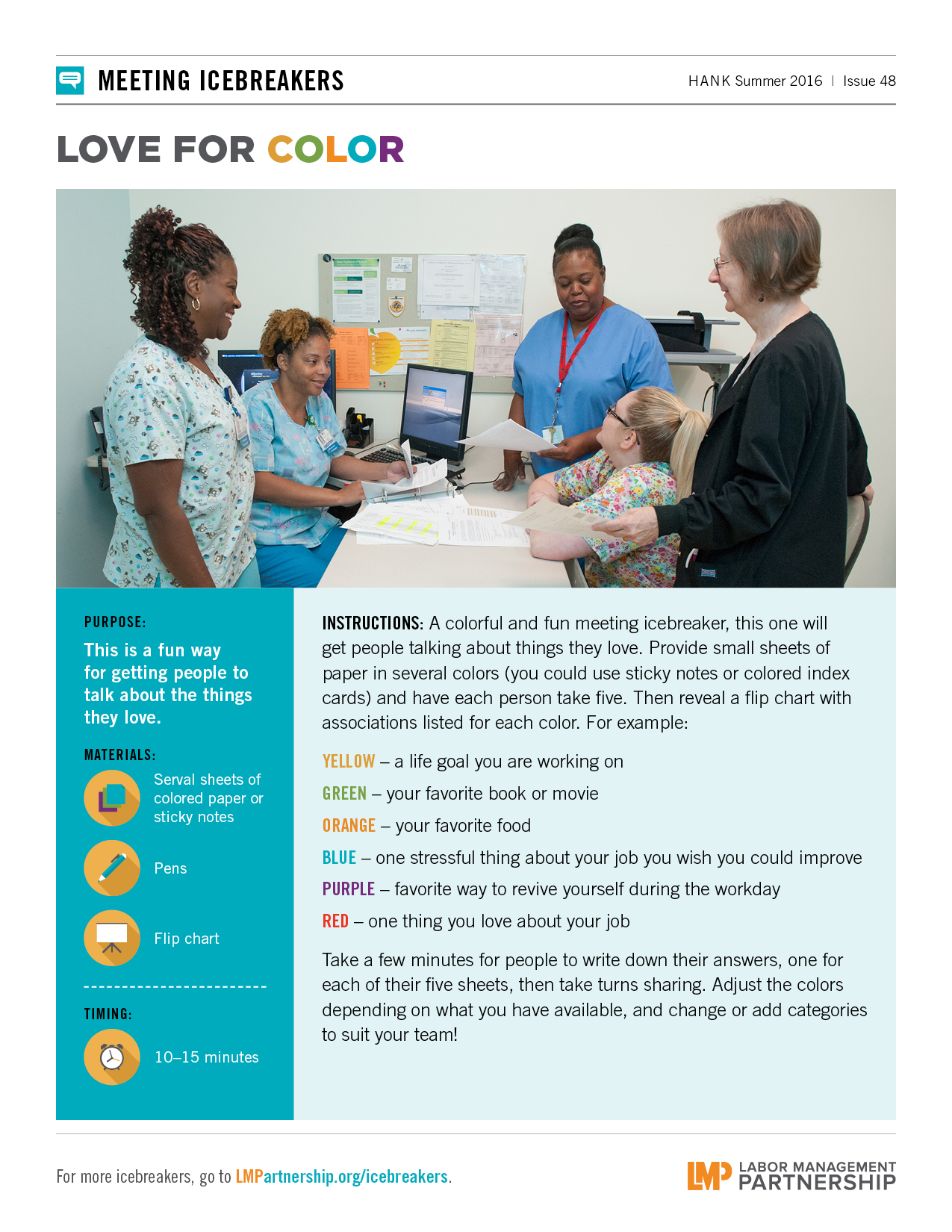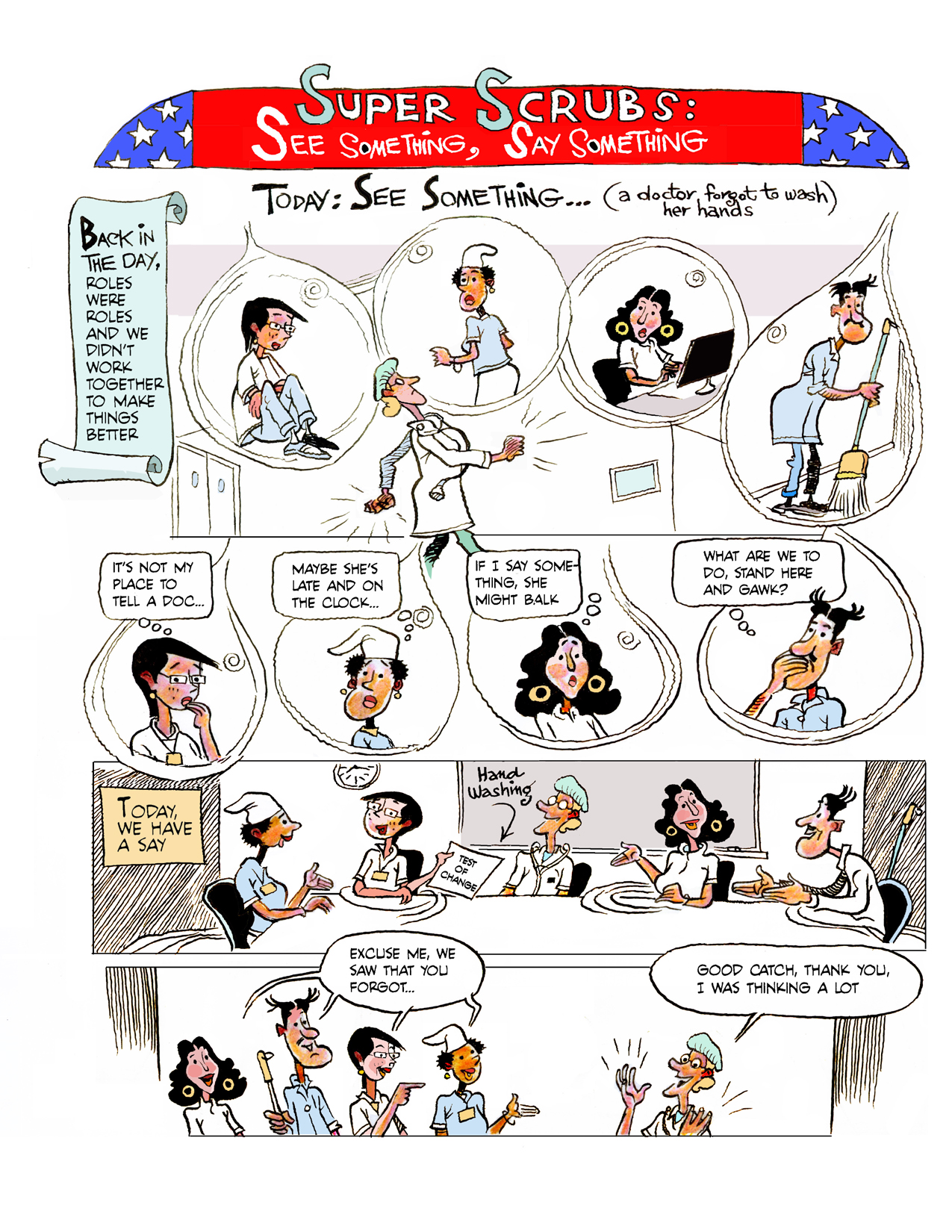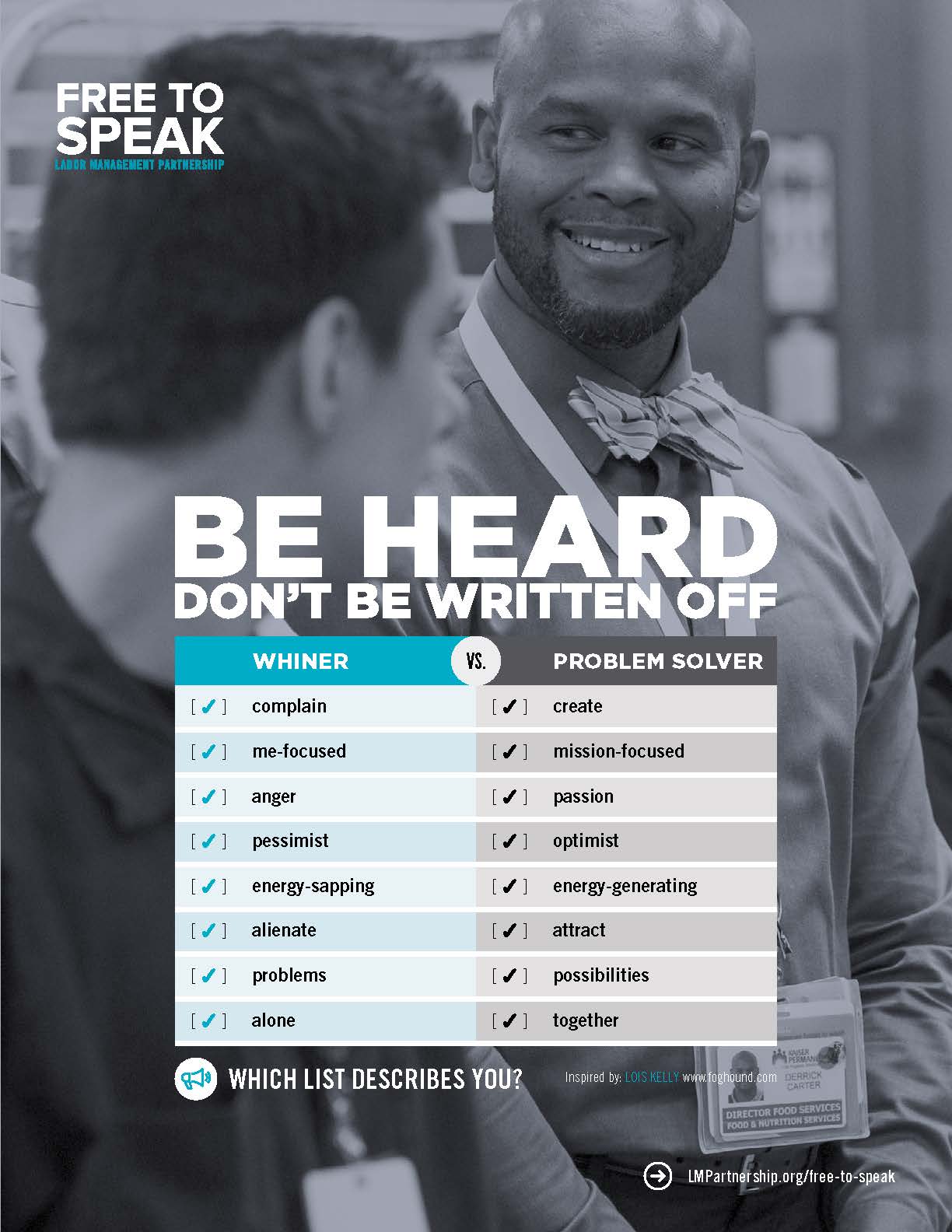Culture
Help Video
How to Find UBT Basics on the LMP Website
LMP Website Overview
How to Find How-To Guides
This short animated video explains how to find and use our powerful how-to guides
How to Find and Use Team-Tested Practices
Does your team want to improve service? Or clinical quality? If you don't know where to start, check out the team-tested practices on the LMP website. This short video shows you how.
How to Use the Search Function on the LMP Website
Having trouble using the search function? Check out this short video to help you search like a pro!
How to Find the Tools on the LMP Website
Need to find a checklist, template or puzzle? Don't know where to start? Check out this short video to find the tools you need on the LMP website with just a few clicks.
Sponsorship, Level 3
TOOLS
Free to Speak: A Union Worker Shows the Way
Format:
PDF
Size:
8.5" x 11"
Intended audience:
Frontline workers, unit-based teams
Best used:
Post these inspiring words from a union worker on our #FreeToSpeak culture on your team's bulletin board or in a break room.
Videos
Grace Under Pressure
(1:28)
The San Rafael Medical Center operators UBT finds ways to manage the stress of answering and responding to tens of thousands of phone calls per month.
TOOLS
Icebreaker: Love for Color
Format:
PDF
Size:
8.5" x 11"
Intended audience:
Frontline employees, managers and physicians
Best used:
Use this meeting icebreaker as a fun way to get people talking about things they love. From the Summer 2016 Hank.
TOOLS
SuperScrubs: See Something, Say Something
Format:
PDF (color or black and white)
Size:
8.5" x 11"
Intended audience:
Anyone with a sense of humor
Best used:
In this full-page comic, our superheroes share how speaking up can keep your work environment—and our patients—safe.
TOOLS
Poster: Be Heard, Don't Be Written Off
Format:
PDF
Size:
8.5" x 11"
Intended audience:
Frontline employees, managers and physicians
Best used:
How we come across is as important as what we have to say. This poster shows the difference between those who complain and accomplish little—and those who are heard and create real change.
On Speaking Up When You're Not the Boss
Deck: Advice from two workers
When employees speak up, teams score high on patient safety, quality, service and workplace safety. But it can be hard to speak up when you don’t feel safe or comfortable. Gain the confidence to use your voice with these tips from two frontline workers with the Ambulatory Care Pharmacy team in West Los Angeles.
Chakana Mayo, pharmacy technician, UFCW Local 770, Workplace safety champion
Practicing speaking up when you feel safe. “When we first began peer rounding, people were comfortable speaking to one another versus speaking with management. Once people were comfortable speaking with one another, then they felt like they could be comfortable speaking with management.”
Your voice can make a difference. “It’s important to speak up early because you can prevent long-term injuries from occurring. If you’re confident enough to speak up to your manager and just let them know what’s going on, they’ll appreciate it more.”
How to Create a ‘Speak-Up’ Culture
Deck: Tips from a manager
Employees who feel free to share their ideas and concerns help keep our patients safe and make Kaiser Permanente a better place to work. Managers can help team members feel comfortable speaking up by creating a “psychologically safe” work environment—one where no one is afraid they will be embarrassed, rejected or punished for speaking up. Here are four tips from supervisor Nee Tang, Pharm.D., Ambulatory Care Pharmacy, West Los Angeles, on how to help workers make their voices heard.
Follow up and take action. “When an employee brings up something, look for the solution and be accountable. Make sure things are done. Having that accountability is really crucial to employees.”
Be authentic. “Having a manager who is open-minded and who truly, genuinely wants to create a safe environment for everybody, that’s the key.”
Be patient and persistent. “In the beginning, people may not be as comfortable speaking out. But once they see we’re coming every month no matter what [to do peer safety rounding], they’re speaking out. We’re really getting the equipment that is needed and reminding everyone about the proper ergonomic positions. People know we’re serious about making an environment that is safe for everyone.”
Find people who want to share their passion with others. “Another key is to have people who are passionate. Angie Chandler, our labor co-lead, is really passionate about ergonomics. I’m passionate about eating healthy. We have another employee who is passionate about exercise. Everybody wants everyone to be safe and healthy and to work well together. We’re passionate about what we do and want to spread that to everybody.”
From the Desk of Henrietta: Are You #FreeToSpeak?
It took a whack on the head—literally—for Tedros Tecle to learn the importance of speaking up.
Tecle is a rad tech at our Santa Rosa Medical Center. Because of a less-than-ideal setup, he banged his head on a mobile X-ray machine. He wasn’t hurt, just really embarrassed. Enough so that he didn’t say anything.
You can guess what happened next: Another tech did the same thing and was injured. The experience motivated Tecle to become a facility workplace safety tri-chair and a champion for speaking up.
Keeping employees, managers, physicians and patients free from injury requires a #FreeToSpeak culture, one where halting work to address a safety concern is a cause for gratitude, not—as in some workplaces—scorn.
In fact, a #FreeToSpeak culture is the foundation for being able to do what we value most at Kaiser Permanente and in the Coalition of Kaiser Permanente Unions: providing high-quality care and service at an affordable price and the best place to work for our employees.
To do that, everyone on our unit-based teams—no matter their role or job title—must feel free to chime in with suggestions about how to make things better, no matter how wacky or inconvenient their ideas might seem. That’s not yet the case; responses to KP’s annual People Pulse survey show the need for improvement.
Creating a speaking-up culture takes time. In this issue of Hank, you’ll find tips and tools to get started and keep going, whether you’re a frontline manager or a union-represented employee. And you’ll hear from the Humans of Partnership who are, more and more, #FreeToSpeak.




